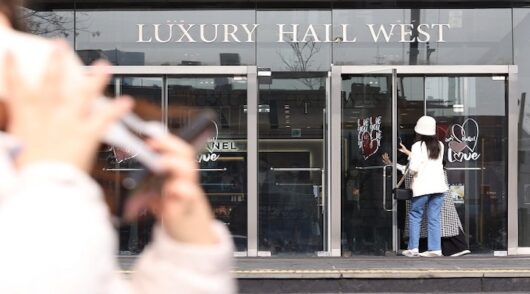Following a profit warning in June, menswear retailer Trinity Group reports a loss for the first half-year because of dampened consumer spending, macroeconomic conditions and restructuring costs.
In a note with the group’s interim results for the period, chairman Victor Fung Kwok King says greater China remains its key market with “significant” opportunities for growth in the light of government policy reforms to strengthen the shift to a consumer-driven economy.
“We are also seeing a growing preference in the Chinese mainland for smaller-format retailers, like Trinity, because they are closer to their consumers. Trinity’s core strategy to ‘target globally, think locally’ means the group is well placed to respond to this new environment.”
However, he says it will take time before the premium menswear sector returns to previous levels of demand.
Trinity has a new CEO following the departure of Richard Cohen after two years. Jeremy Hobbins returned to the company in June to take over the reins.
Headcounts reduced
In the first half of the year, the group continued to drive efficiencies, closing 16 unprofitable stores (it now has 333 outlets). The casualwear production line at the Hong Kong factory was terminated, plus the group “significantly reduced the headcount of senior executives and consultants”, says Hobbins.
This has brought its total workforce down to 2665 from 2738 at the end of last year.
During the first half, there have been developments in the group’s new omnichannel and eCommerce offer, including the appointment of a dedicated senior VP to lead this activity.
A new worldwide licensing arrangement with British fashion house Hardy Amies has strengthened the group’s brand portfolio, while the Gieves & Hawkes’ flagship store remains profitable. At Kent & Curwen, the group’s partnership with fashion icon David Beckham is making progress toward a launch for his collection.
Revenue for the first half was HK$890.8 million (US$114.8 million), 11.5 per cent down on the same period last year. Excluding the effect of exchange rate differences, revenue dropped by 8.7 per cent while same-stores sales fell by 14.2 per cent.
With fewer mainland visitors, retail sales in Hong Kong/Macau fell 13 per cent to HK$258.1 million, with same-store sales dropping 11.9 per cent.
Mainland sales at $378 million were down 23.1 per cent, or 19.5 per cent excluding the effect of exchange rates.
Stores closed
The group closed 50 unprofitable stores in China last year, and a further 19 within the latest first half. Meanwhile, wholesale revenue in China grew from $3.4 million to $54.9 million.
Retail sales in Taiwan fell 17.8 per cent to $64.8 million, while the decline in same-store sales was 18.1 per cent.
Gross profit for the group declined 14.7 per cent to $606.8 million for the first half. The retail gross profit margin for China improved from 70.1 to 71.8 per cent, mainly because of lower average discounts and better mark-up.
For Hong Kong/Macau and Taiwan, the gross profit margins were stable at 72.2 and 65.2 per cent respectively. For the same period last year, the figures were 74.5 and 67.5 per cent.
In support of the Hong Kong government’s fight against climate change, the group continues to donate all money from plastic bag charges to the Plastic Shopping Bag Collaborative Platform.
The group is also committed to improving its vendor compliance scheme, asking suppliers to sign its code of conduct. It says it will immediately terminate contracts with suppliers found breaching zero-tolerance issues, such as the employment of underage staff.






